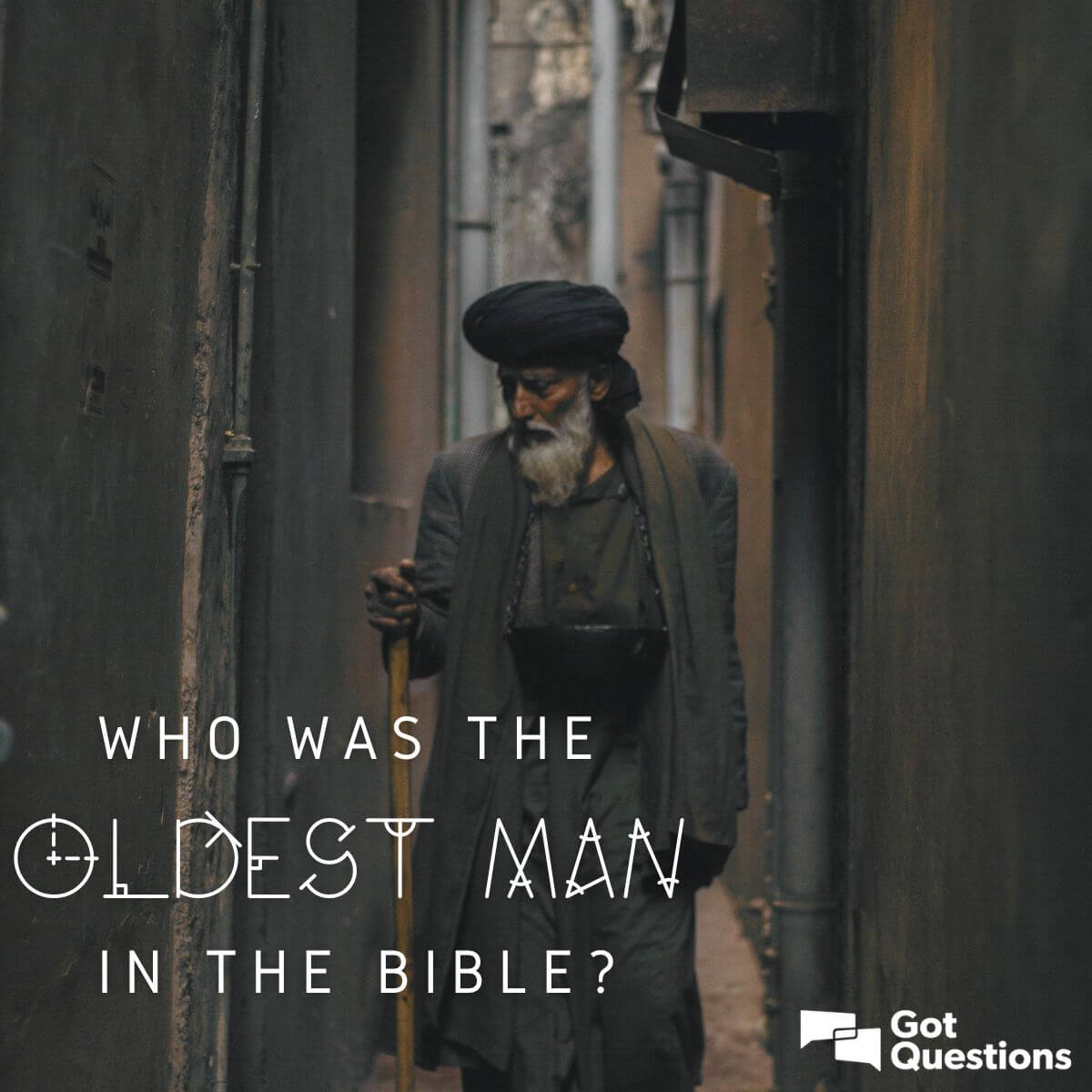Have you ever wondered who holds the title of the oldest person in the Bible? This question has intrigued theologians, historians, and spiritual seekers for centuries. The Bible, a sacred text revered by millions worldwide, contains stories of extraordinary individuals whose lives reflect profound faith, resilience, and divine purpose. Among these remarkable figures, one stands out for their incredible longevity—Methuselah. His story not only captivates our imagination but also invites us to explore deeper truths about life, faith, and the human condition.
The Bible is not just a historical or religious document; it is a treasure trove of wisdom, offering timeless lessons for every generation. One of the most fascinating aspects of the Bible is its accounts of individuals who lived for centuries. These stories challenge our understanding of human life and raise questions about the nature of existence. By exploring the life of Methuselah, the oldest person in the Bible, we can gain valuable insights into the values, beliefs, and teachings that shaped ancient civilizations and continue to influence modern life.
In this article, we will delve into the life of Methuselah, examining his role in biblical history, the cultural context of his time, and the lessons we can learn from his extraordinary lifespan. We will also explore related topics, such as the significance of longevity in the Bible, the theological implications of Methuselah’s life, and how his story resonates with contemporary audiences. By the end of this article, you will have a comprehensive understanding of Methuselah’s legacy and its relevance to your own life.
Read also:Subhashree Sahu A Rising Star In Indian Entertainment
Table of Contents
- Biography of Methuselah
- Cultural Context of Longevity in the Bible
- Theological Implications of Methuselah’s Life
- Lessons from Methuselah’s Longevity
- Scientific Perspectives on Biblical Longevity
- Methuselah’s Legacy in Modern Times
- Longevity in Other Religious Texts
- The Symbolism of Methuselah’s Name
- Methuselah in Popular Culture
- Conclusion
Biography of Methuselah
Methuselah is one of the most well-known figures in the Bible, primarily due to his incredible lifespan of 969 years. His story is recorded in the Book of Genesis, where he is mentioned as the son of Enoch and the grandfather of Noah. Methuselah’s life is significant not only because of his longevity but also because of his role in the genealogical line leading to Noah, the protagonist of the Great Flood narrative.
Data and Biodata of Methuselah
| Attribute | Details |
|---|---|
| Name | Methuselah |
| Meaning of Name | "Man of the Dart" or "His Death Shall Bring" |
| Father | Enoch |
| Son | Lamech |
| Grandson | Noah |
| Lifespan | 969 years |
Methuselah’s father, Enoch, is another notable biblical figure known for his close relationship with God. According to Genesis 5:24, Enoch "walked faithfully with God; then he was no more, because God took him away." This miraculous event sets the stage for Methuselah’s life, which is marked by both divine favor and human mortality.
Cultural Context of Longevity in the Bible
To fully appreciate Methuselah’s lifespan, it is essential to understand the cultural and historical context of longevity in the Bible. During the early chapters of Genesis, many individuals are recorded as living for hundreds of years. For example, Adam lived for 930 years, Seth for 912 years, and Noah for 950 years. This pattern of extraordinary longevity raises questions about the nature of human life in ancient times.
One possible explanation is that these lifespans symbolize the divine perfection and abundance of God’s creation. In the biblical worldview, human beings were created to live in harmony with God, and their long lives reflect the original intention for humanity to thrive. However, as sin entered the world, lifespans gradually decreased, culminating in the post-flood era when God declared, "My Spirit will not contend with humans forever, for they are mortal; their days will be a hundred and twenty years" (Genesis 6:3).
Why Methuselah’s Age Matters
Methuselah’s age of 969 years is not just a number; it carries deep symbolic meaning. His lifespan bridges the pre-flood and post-flood worlds, serving as a testament to God’s patience and mercy. According to Jewish tradition, Methuselah died in the year of the Great Flood, suggesting that his death marked a turning point in human history. This interpretation underscores the idea that Methuselah’s life was divinely ordained to fulfill a specific purpose.
Theological Implications of Methuselah’s Life
Methuselah’s story invites us to reflect on several theological themes, including divine patience, human mortality, and the consequences of sin. His long life can be seen as a demonstration of God’s grace, giving humanity ample time to repent and return to Him. Despite the widespread corruption and violence that characterized the pre-flood world, God delayed judgment until Methuselah’s death, allowing for the possibility of redemption.
Read also:Aditi Mistry A Comprehensive Guide To Her Life Career And Achievements
Moreover, Methuselah’s lineage highlights the continuity of God’s covenant with humanity. As the grandfather of Noah, Methuselah played a crucial role in preserving the human race and ensuring the fulfillment of God’s promises. His life serves as a reminder that even in times of darkness, God remains faithful to His people and works through ordinary individuals to accomplish extraordinary purposes.
The Connection to Noah’s Ark
Methuselah’s grandson, Noah, is one of the central figures in the Bible, known for building the ark and surviving the Great Flood. Methuselah’s role as Noah’s grandfather underscores the importance of family and generational faith. His life exemplifies the biblical principle that "the righteous will live by faith" (Hebrews 10:38), as he trusted in God’s plan despite the challenges of his time.
Lessons from Methuselah’s Longevity
Methuselah’s extraordinary lifespan offers valuable lessons for modern readers. One key takeaway is the importance of living with purpose and intentionality. While Methuselah lived for nearly a millennium, his life was not marked by idleness or self-indulgence. Instead, he fulfilled his role in God’s plan by raising a family and contributing to the preservation of humanity.
Another lesson is the value of patience and perseverance. Methuselah’s long life demonstrates that God’s timing is perfect, even when it seems delayed from a human perspective. In a world that often prioritizes instant gratification, Methuselah’s story encourages us to trust in God’s timing and remain steadfast in our faith.
Practical Applications for Today
Here are some practical ways to apply Methuselah’s lessons to your own life:
- Focus on building meaningful relationships and leaving a lasting legacy.
- Trust in God’s plan, even when circumstances seem uncertain.
- Prioritize spiritual growth and faithfulness over worldly success.
Scientific Perspectives on Biblical Longevity
While the Bible attributes Methuselah’s longevity to divine intervention, modern science offers alternative explanations for the extraordinary lifespans recorded in Genesis. Some researchers suggest that environmental factors, such as a pristine atmosphere and abundant natural resources, may have contributed to longer lifespans in ancient times. Others propose that genetic factors or the absence of chronic diseases could have played a role.
However, it is important to note that the Bible’s accounts of longevity are not intended to be taken as purely historical or scientific records. Instead, they convey theological truths and moral lessons that transcend time and culture. By examining these stories through both spiritual and scientific lenses, we can gain a deeper appreciation for their significance.
Methuselah’s Legacy in Modern Times
Methuselah’s legacy continues to resonate with people of all ages and backgrounds. His name has become synonymous with longevity, inspiring countless references in literature, art, and popular culture. For example, the term "as old as Methuselah" is commonly used to describe someone who has lived for a very long time.
In addition to his cultural impact, Methuselah’s story remains relevant to contemporary discussions about aging, health, and spirituality. As advancements in medical science extend human lifespans, Methuselah’s example challenges us to consider how we can use our time wisely and live with purpose.
Modern Interpretations of Methuselah’s Life
Today, Methuselah’s story is often interpreted as a metaphor for resilience and endurance. His life reminds us that even in the face of adversity, we can remain faithful and fulfill our God-given purpose. Whether through acts of kindness, creative expression, or spiritual devotion, each of us has the potential to leave a lasting impact on the world.
Longevity in Other Religious Texts
Methuselah’s story is not unique to the Bible; many religious traditions feature accounts of individuals with extraordinary lifespans. For example, in Hindu mythology, the sage Markandeya is said to have lived for thousands of years. Similarly, in Islamic tradition, figures such as Noah and Adam are described as living for centuries.
These stories highlight a universal fascination with longevity and immortality, reflecting humanity’s desire to transcend the limitations of time and mortality. By comparing Methuselah’s story with similar narratives from other traditions, we can gain a broader perspective on the shared values and aspirations that unite diverse cultures.
The Symbolism of Methuselah’s Name
Methuselah’s name carries profound symbolic meaning, offering additional insights into his role in biblical history. In Hebrew, his name is often interpreted as "Man of the Dart" or "His Death Shall Bring." This latter interpretation aligns with the biblical narrative, as Methuselah’s death coincides with the onset of the Great Flood.
The symbolic significance of Methuselah’s name underscores the idea that his life was divinely ordained to serve a specific purpose. His death marked the end of an era and the beginning of a new chapter in human history, emphasizing the cyclical nature of life and the inevitability of change.
Methuselah in Popular Culture
Methuselah’s story has inspired countless adaptations in literature, film, and other forms of media. From novels and poems to movies and television shows, his name and legacy continue to captivate audiences worldwide. For example, in the 2014 film "Noah," directed by Darren Aronofsky, Methuselah is portrayed as a wise and mystical figure who guides Noah on his mission to build the ark.
These adaptations not only bring Methuselah’s story to life but also invite modern audiences to engage with its timeless themes. Whether through entertainment or education, Methuselah’s legacy serves as a bridge between ancient wisdom and contemporary culture.
Conclusion
In conclusion, Methuselah’s story is a testament to the enduring power of faith, resilience, and divine purpose. As the oldest person in the Bible, his life challenges us to reflect on our own mortality and consider how we can use our time wisely. By exploring the cultural, theological, and scientific dimensions of Methuselah’s story, we gain a deeper appreciation for its relevance to our lives today.
We invite you to share your thoughts and reflections on Methuselah’s legacy in the comments below. How does his

